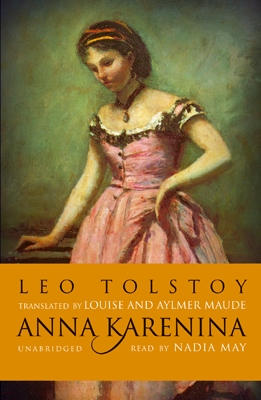A couple nights ago, we were invited to share snacks and have a "discussion" at the principal's house, which by the way, is right behind the guest house where I live. By now, I should be getting used to words not being used in the same ways that they are in the states, because what they meant by "discussion" was not the serious kind of talk I was expecting. They meant it more like coming over for chit-chat. Another example is when people mean to ask "How can I help you?" or "Do you have a problem?" They, instead, say "What's wrong with you?" I was almost offended the first time I heard someone say that to me.
We sat down around the principal's kitchen table with a snack already prepared in front of us. "Snack" was also different from what I had expected. Their "snack" was closer to a second dinner. There were these thick, tennis ball-sized, rice balls meant to be dipped in a heavy masala sauce. I regretted just eating a big dinner. Sejalben, the principal's daughter, had made these snacks and was watching us all intently as we ate. As I struggled to get through even one rice ball, I felt obligated to keep eating, and eating, and eating.
We were all also given a shot glass-sized dish with something that looked like ice cream inside. When Sejalben was explaining what it was, I only caught the words "cream" and "coconut," so, being the cultural expert that I am, I picked up the glass and starting drinking it. Hmm.. not as sweet as I expected. In fact, it was quite bitter. And it had a strange, gritty texture to it. This isn't enjoyable at all! With a very confused looked on her face, Sejalben asked me what I what I was doing. "That is another sauce for dipping."
During our "discussion," we got to know the principal's family a little more. We learned that 12 people live in the same house: the principal and his wife, their parents, their children, and their children's children! In India, they explained to me, families are happy when they remain together. The principal's son told me that he looks forward to coming home to spend time with his family everyday when he's at work. I think most of us would agree that this is pretty rare mentality for people to have in the states. Most kids can't wait to go off to college, leave the house, and start their own lives. I guess some people would say that this happens because of urbanization, modernization, etc. But what I saw that night were people that are a whole lot more confident in their cultural values, people who hold onto these values and allow them to shape their lives.
One of the strongest values that defines American life is the drive to succeed and simply make it in the world. I'm not saying that people here don't want to be successful. But is there something we lose when the desire to become successful overshadows other values and colors the way we live, interact with others, and view our surroundings? I'm slowly digesting this food for thought.
The Principal's Family
Here's Your New Timetable, Sir
The timetable is what I rely on to tell me which class I need to go to and when I need to be there. The other teachers here seemed to have their timetables hardwired into their brains by the end of the first day of school, but I still have to glance at mine every half hour to make sure I'm where I'm supposed to be.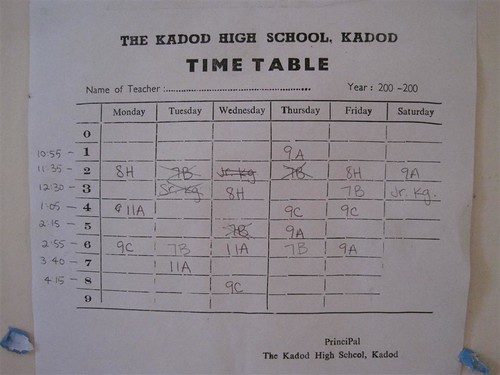
Unfortunately, the English department is probably the most unorganized and oftentimes clueless when it comes to knowing where teachers are supposed to be and when. There hasn't been one day that I haven't been approached by the supervisor telling me that a new timetable had been made for me. This morning, yet another new schedule had been given to me. It had an 11th standard class that I had not taught before. I had only taught up to 9th standard up until now. To make things worse, my new co-teacher, Yogeshbhai, was nowhere to be found. This time, without a co-teacher, I wasn't let off so easily. The head of the English department, Sejalben, told me that I would still have to teach my classes today, with or without Yogeshbhai. I asked her what I should do since I don't know any Gujarati. She just laughed and said "Good luck!" as she walked away.
Couldn't be too bad. I'll just have the students do some reading exercises or pronunciation drills. As I walked towards the 11th standard classroom, my stomach suddenly sank 10 feet. The class was humongous! I walked through the door and tried not to show any of the emotions that were eating away at my insides. They rose to their feet and let out a resounding, "GOOD MORNING, SIR." After telling them to sit down. I walked up and down the aisles with my hands crossed behind my back, asking students to take out their books. I had no idea what I was going to do, but I figured that was a good place to start.
"This class is big!" I said. "How many students are here?"
"88!" replied a few students.
The students were on a unit covering poetry, so after asking many of the students to read verses out loud, I reviewed the concept of rhyming words and rhythm when reading poetry. Taking the advice of some of the other teachers on classroom management, I made 3 boys stand up for the last 20 minutes of class for talking after being given a warning. I hate being the mean teacher.. but I think that it was necessary.
Yogeshbhai arrived to school just after my 11th standard class. Jokingly, I told him that if he decided to play hooky, he should have just gone all the way. We then had a 15 minute conversation on the meaning of the word hooky. Not quite the effect I thought my punchline would have.
A Not-So-Lazy Sunday
The day started at 7:30am. After a quick shower and getting dressed in my Sunday best, I went outside to find that Vimulbhai, our most trusted driver, was ready to take Emily and me to our first church in India. It was a little bit of a drive (close to an hour), but we eventually reached a town called Vyara where there was protestant church by the name of Vyara Church of North India. The service was completely in Gujarati, so I pretty much had no idea what was going on from beginning to end except for a few times during the message when the pastor inserted some English phrases to accommodate slightly for our presence in the audience. It was a really nice gesture in my opinion. I estimated that the congregation was around 300 in size, and I was later told that there's actually a relatively large Christian population in Gujarat. There's a church in Surat with membership over 10,000!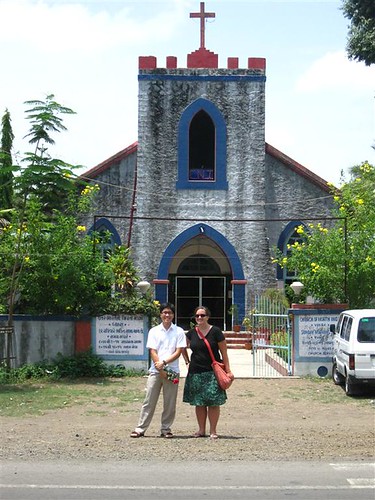
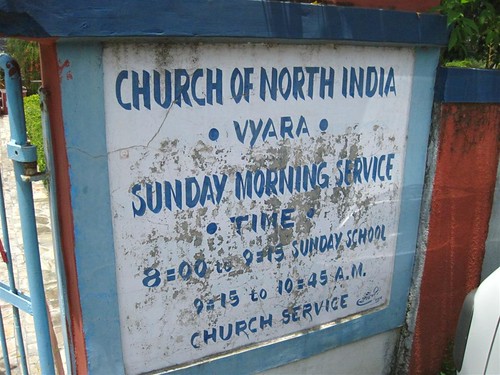
When service ended, the pastor stood by the door and shook hands with people as they left. We were last to leave the sanctuary, so when we stopped to greet the pastor, he immediately invited us to join him and his family in his house just across the street. Over cups of chai, he told us a little of the history of the church. It was built 100 years ago, a church-plant initiated by two U.S. missionaries. About 15 years ago, a number of churches throughout India began to work together and formed two networks, Church of North India and Church of South India.
We said our goodbyes, and I told the pastor that I would be seeing him often over this next year. He told me that starting in a month, they were going to be having English services on Sunday nights. Something to definitely look forward to! Vimulbhai decided to take us on a longer, but more scenic, route back to Kadod.
Unfortunately, we were forced to take an even longer detour when a train was stopped on the tracks after hitting a cow. :( Emily actually witnessed the accident happen a little to our left.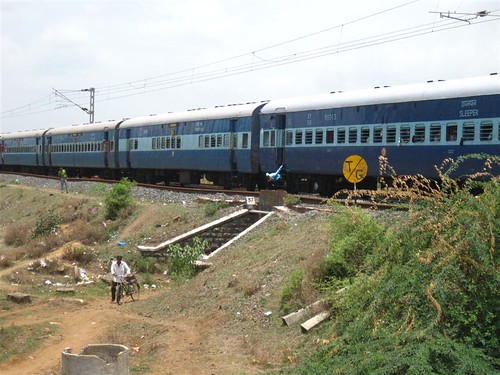
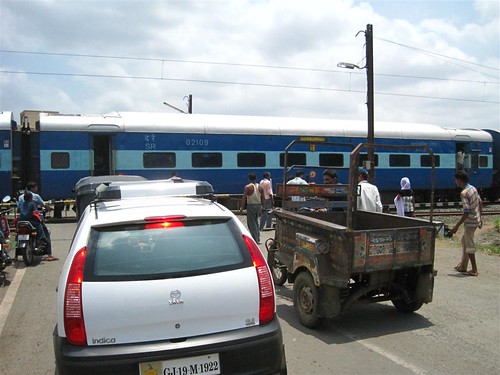
He drove us through towns that I had not yet seen. Some of the houses in these towns, he explained, were built hundreds of years ago and had beautiful woodwork decorating the outsides! We stopped at a town named Kakrapar where we walked to a dam that had one of the most amazing views I've seen in India so far. The water was actually blue, unlike the water of most of rivers/lakes in India, and Vimulbhai told us that it was cold, too. He promised to take us back next weekend if the monsoon doesn't start by then so we can go for a swim!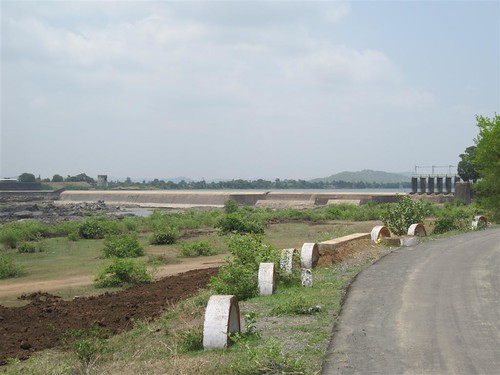


Well, it's Sunday afternoon, and now, Zach and I have to prepare our Spoken English lesson plans for the week. I hope for more weekends like this in the future where I get to see some places that are more off the beaten path in Gujarat!
Next episode: Kadodian Wildlife
Day Trip to Bardoli
I can barely believe that my second week in India is already over! To give a quick overview of some of the things that happened this past week (I need that narrator's voice that's like "Previously.. on Eric in Kadod..), I started Spoken English classes, said goodbye to my first co-teacher, said hello to my new co-teacher, had 3 pants made/tailored, and engaged in an hour long conversation with the tailors about the history of the Korean War (you know, the usual).
After Saturday classes, I was ready to get out of town for a bit and do some more exploring. So, we decided to see some of Bardoli, a city just about 30 minutes by bus from Kadod. Visiting Bardoli was a nice change of pace, but not like the kind of change I experienced in Surat the weekend before (thank goodness). We roamed the streets, visited some stores, and ate at a restaurant called U.S. Pizza. Yes, they had American style pizzas! (all veg though) Anyways, there isn't much more to explain. I hope you guys enjoy these pictures and a video of a very crowded bus ride back to Kadod! (more pictures on flickr)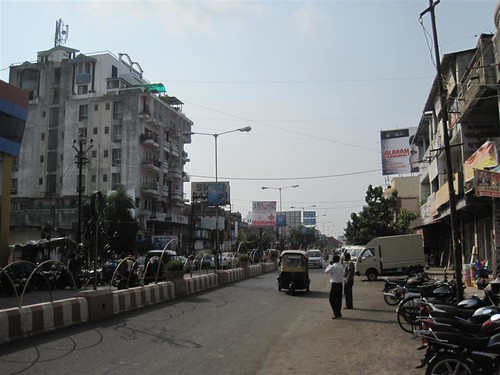
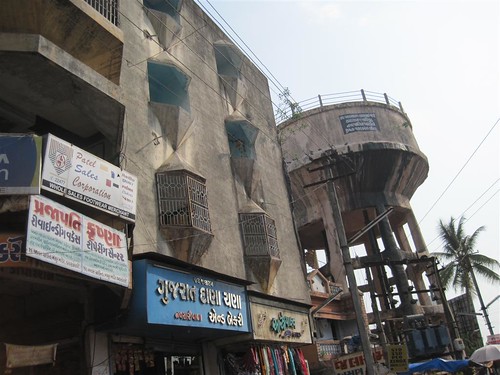
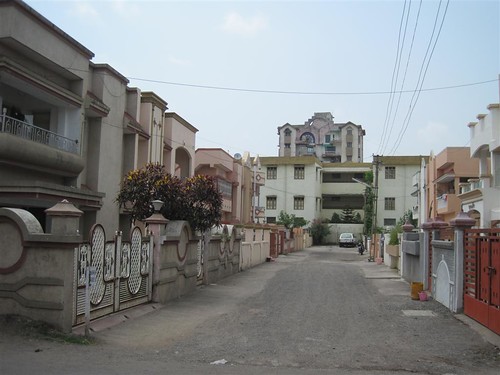
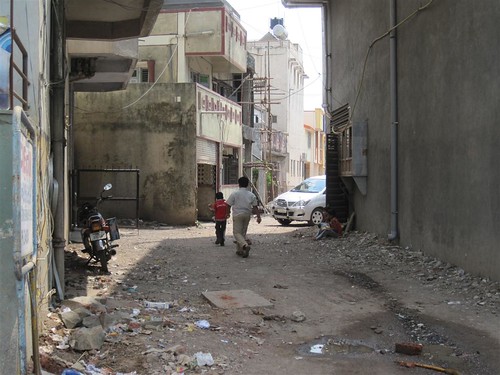

Spoken English Class, Pt. 1
Welcome to Spoken English class, an initiative of the Nanubhai Education Foundation! Before and after school between Mondays and Fridays, Zach and I lead our own Spoken English classes to improve students' abilities to use English in a more conversational manner. The class is completely voluntary, and the number of registered students was capped at 120 (which means 30 per class since we each teach one in the morning and one in the afternoon). If you read my last entry, you got a sense of how little English most students actually learn in their academic English classes. Spoken English class is meant to be part of the solution to English-learning problem at Kadod High School. Our goal is to teach the students useful English phrases, get them to practice them with each other, and hopefully, by the end, have them be able to hold simple conversations without hesitation or a need to have sentences repeated multiple times. Since this is a non-academic class, we have a little more flexibility with how we structure class times, which means more interactive activities and an aspect of "fun" that is nearly nonexistent in normal classrooms.
Day 2 of Spoken English class just finished, and my initial assessment is... a lot more work needs to be done. In Day 1, we taught the students how to describe basic emotions in response to the question, "How are you?" Whenever I ask students (or adults for that matter) this question in English, the response I get 99% of the time is "I am fine." That answer has somehow become embedded in most Indians as the only answer to the question, "How are you?" So we attempted to expand the range of responses that the students could give for that simple, yet important, question. The lesson was going really well! It seemed that students were getting more and more comfortable giving varied responses, so I decided to take it a step further and add a little more complexity. I wrote an example dialogue on the board.
A: How are you?
B: I am great!
A: Why are you great?
B: Because I love India!
I read the dialogue out loud and asked the students if they understood. I was met by a resounding "yes!" My face must have been beaming as thoughts of these students' imminent fluency in English soared through my mind. Eager to see what the students could do with this dialogue structure, I asked the class, "Who wants to practice first?"
The hand of a small girl sitting in the second row shot up in the air before any of her classmates. Asking her to stand up, I gave her the question, "How are you?"
"I am great!" she replied.
"How about using another word? Something other than great," I told her.
"I am... sad!" she then said. Hmm.. that's an interesting response. But I decided to just go with it.
"Why are you sad?" I asked
"Because I love India!"
Most of the class burst into laughter as she sat back down with a smile on her face, proud of her accomplishment. I know as a teacher, I shouldn't laugh when students get things wrong, but, in that moment, it was honestly too hard to contain myself. Sure, I had to take a few steps back and explain the dialogue bit by bit, and sure, some of the students might still not have gotten it completely. But I'm anything but discouraged. When I dismissed the students at the end of class, they all ran out of the classroom yelling "Bye, teacher!" or "Bye, Mr. Eric!" and I thought that even though they might have a ways to go before reaching conversational levels in English, it brings me so much joy seeing them actually want to learn English.
For your enjoyment, a short clip from a charades game we played to practice describing actions in response to the question, "What are you doing?"
Physics Lab
During one of my free periods, I came across a 12th standard physics book in the staff room. Maybe it was my inner pre-med coming out, but being curious, I sat down and started flipping through it. The 12th standard physics teacher came over just a few moments later and, seeing my interest in the book, asked me if I wanted to sit in on his physics lab class later in the afternoon. I said sure, and he explained to me that at 3:30, there would be a school worker waiting for me at the staff room to take me to the physics lab room since I didn't know exactly where it was.
At 3:30, I made my way back up to the staff room and saw a school worker with his gaze fixed upon me. I knew this was probably the man I was looking for, and as I approached him, he took out a small piece of paper from his pocket and slowly unfolded it in front of his chest.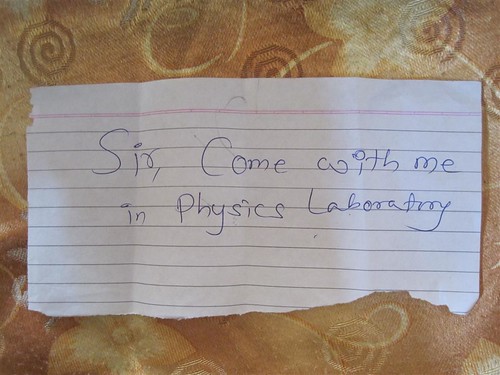
With a smile and slight head bob, I communicated to him that I understood, and him and I started walking towards the lab.
Class was actually scheduled to start at 3:40, so for those 10 free minutes, the physics teacher eagerly took me from station to station, describing each of the experiments, letting me try out the instruments, and explaining what the students would be asked to do. Some pictures of the lab are posted below. Don't let the shabby appearance of the room fool you. These kids would smoke most 12th graders in physics. What we cover in AP Physics A/B/C, these students have already finished by 10th standard. When the students walked into lab, they hardly needed any introduction to the experiments before they went right into taking measurements and fiddling around with resistances, focal lengths, etc.

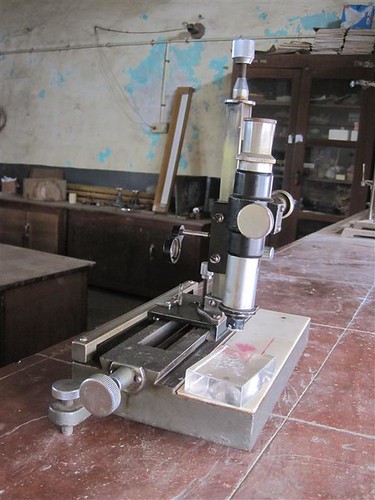
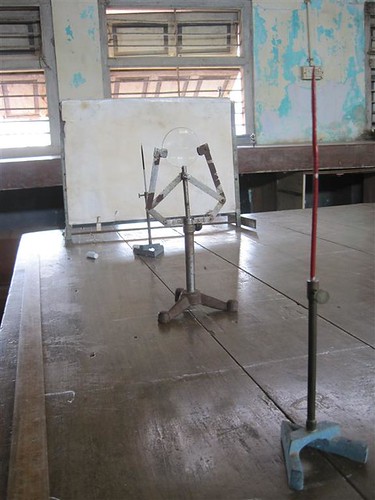
Throughout India, there's a sense of prestige attached to students that enter into the science track during high school. Whether or not they can enter into this track is determined by how well they do on standardized tests. Students that complete the science track have the opportunity of going on and getting bachelors of science degrees which then allows them to become engineers, doctors, and IT specialists. This is the top echelon of careers that most Indians aspire towards. Where does English fall in? The sense that I've gotten already is that most students just treat English as a hurdle that they have to just manage to jump over so they can run towards their higher goals. If they can simply memorize stories and essays to get good marks on their standardized tests, they'd rather do that than spend time actually learning the language. This is a struggle that I'm sure I'll be dealing with all year. All I've been told when I voice my complaints is that I have to accept this as the way things just are and that I should just teach English the way that its always been taught at this school. Le sigh.
Co-teachers? What Co-teachers?
I felt very fortunate during my first week to have the help of my co-teacher, Kirinbhai, in my classes. We made a pretty good team. As I asked the students questions, occasionally, I would just be met by a bunch of blank faces. Kirinbahi would then jump in and explain to the students in Gujarati what I had asked, even breaking down my questions/statements word for word on the board so the students really understood what I had said in English. During our free periods, I would sit down with Kirinbhai in the teacher staffroom. I would give him short English lessons, and he would, in return, give me invaluable Hindi lessons. I thought we had a pretty good thing going. This all ended when he came up to me yesterday and broke the news that he was going to get a permanent, government teaching job in a city elsewhere.
Teachers that receive their M.A. to be qualified to teach will apply for "permanent" government teaching positions, unless they have some connection to work for a privately-run school. The longer they work as a government-hired teacher, the more they get paid. In the co-teaching model of the Nanubhai Education Foundation, co-teachers are essentially hired by the Foundation and the Kadod High School principal, not by the government. Since Kirinbhai was not being paid any more than a first year government-hired teacher, his logical, best course-of-action would be to apply to work through the government, giving him job security and the promise of better pay in the future. To fix this broken model, Nanubhai should offer to pay the co-teacher a greater salary that offsets the cost of not immediately getting the permanent government position. However, the principal of the high school obstinately decided that the co-teacher should not be paid more than they're worth. So, in fact, they are being paid less than what they could make in their first year employed by the government.
Zach's co-teacher, Binitaben, is also calling it quits at Kadod High School. In about an hour, I'll be teaching 8th, 9th, and 11th standard classes without Kirinbhai's help. What are my students going to do? With the amount of Hindi that I know, I can't translate a single sentence of the stories that I have to teach. Plus, some students only know Gujarati, a language I haven't even attempted to understand yet. I'd better scrap something together with the hour I have left. Check the update to see how my classes went!
**UPDATE**
I went up to the staffroom about half an hour before class. The teachers that were there invited me to eat mangoes with them. I had yet to know how to eat those ripe Indian mangoes without making a complete mess, so I watched as one of the teachers used a knife to make cuts in the fruit with surgical precision. I think he noticed at how intently I was watching, and after he cut the first mango, he handed the knife over to me and said something in Gujarati, presumably something like, "Would you like to try?" As I tried to mimic what I'd just observed, I still managed to get mango juice all over my hands and the tray. The teachers got a good laugh out of it, but in the end, I was able to produce a few good slices of mango. Sigh, my nerves had calmed a lot, and I felt like I was ready for classes. At that moment, one of the supervisors came to me and asked me to come into his office. He could only speak to me in Hindi, so after a few rounds of him speaking and me asking him to repeat more slowly, I realized he was telling me that because Kirinbhai would not be here, they would find a replacement co-teacher . Until then, at least for the next couple of days, I would not be teaching. Apologies for the anti-climatic ending for those of you that were waiting for an Eric crashing and burning story.
Weekend in Surat
To summarize how I feel after this weekend, all I have to say is that I am really glad to be back in the quiet, peaceful community of Kadod in the comfort of my bedroom. How to begin to describe how spending the weekend in Surat was... Well, we stepped out of the bus, and one of the first things we had to do was play a real life game of Frogger to get to the other side of the street and start looking for hotels.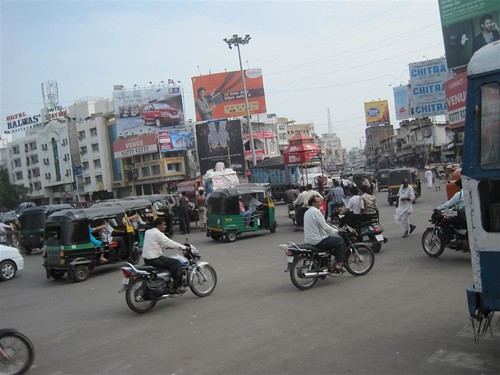
We must've just stood there for at least 5 minutes, just watching traffic whizzing by in all directions, laughing and asking ourselves whether or not this was really going to happen. But as we watched other Indians walk into the river of auto-rickshaws, buses, cars, and motorcycles, seemingly unphased by the prospect of possibly losing their lives, we realized that we just had to take our first steps, and trust that the traffic would avoid us. What I learned is that once I step out into the street, I can't stop. The drivers heading toward me expect me to keep walking, and they adjust their direction accordingly. When I froze a couple of times, I'll admit I was nearly grazed by some vehicles.
After checking the rates at a few hotels, we settled on one called the Dreamland Hotel. The owner of the hotel, Anil, sat us down in his office and demanded that we share a cup of coffee and biscuits with him before we headed back out. Nice guy. For the rest of the afternoon, we took rickshaws from one part of the city to another. There wasn't much for us to do. It was fun seeing the occasional American store like a Baskin Robbins, Pizza Hut, and Citibank. We ended the day at the Kandeel Revolving Restaurant, a restaurant that does just what it says it does at the top of a hotel. The dinner was a buffet, and the food was incredible (for only $5)!
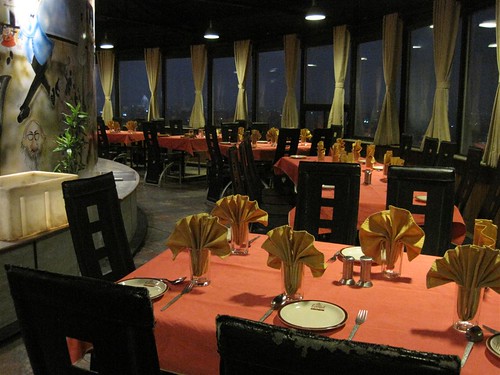
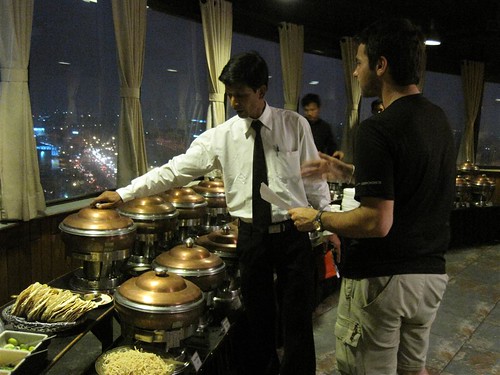
After a good night of sleep, we were excited to do some more exploring. We stopped a rickshaw driver and just asked him to take a place for breakfast that's cheap with good food. He first suggested a place that was just around the corner, but we, wanting to be a bit more adventurous, told him to take us farther. "Oh, beach is very nice. And very good place eat there is." Wow! The beach! The 50-minute ride in the cramped rickshaw seemed worth it for a good meal by the beach. Here are some important observations we made as soon as we got out and paid the driver his fare:
1. The extent of food was a few snack stands.
2. The sand was an alluvial soil (aka mud).
3. The nearest point where there was water was at least a 30-minute walk out through the mud.
We'd taken the effort to get that far, so we figured we couldn't just go back without at least having reached the water. The first few minutes of the walk were fine. The mud was dry enough to give us firm footing. The further we went out, though, the wetter the mud became until my sandals were carrying about 5 pounds of mud each. Had to lose the sandals and walk with mud filling the spaces between my toes and sometimes coming up as high as my ankles. Here are some of the more scenic shots I was able to capture.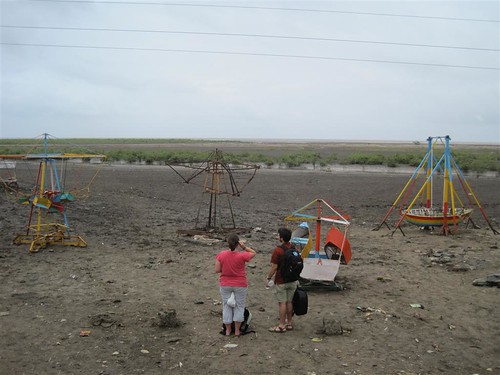
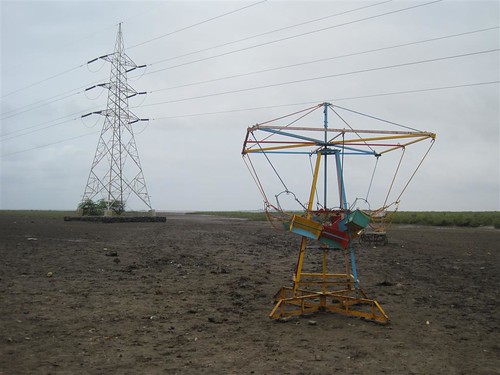
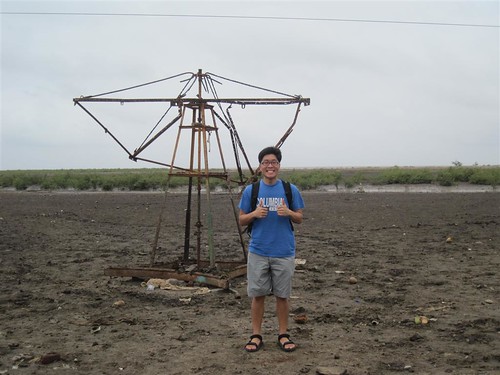
In summary, it might be a little while before I make a trip back out to Surat, but I'm also glad I've been able to see a little bit more of India outside of Kadod. Going on this mini-adventure has made me excited about getting out and really exploring this country. Walking through downtown Surat with legs caked in dried mud, I think things can only be uphill from here!
First Days of Teaching
6.16.2010
In the weeks leading up to my arrival, I was told that for the first week of classes, my only responsibility would be to observe while my co-teacher took the lead on teaching the lessons. I looked forward to this first week being a relatively comfortable adjustment period, so while I was getting used to life in a new country, learning to be a teacher could be placed on the backburner momentarily. It was the morning after we arrived in Kadod, a Monday, the first day of classes. I walked into the men's teacher staffroom to meet my co-teacher, Kirin-bhai, for the first time. After exchanging hello's and brief introductions, we had this conversation:
Me: So for the first class, what will you do?
K: What you mean?
Me: I mean, what are you going to teach?
K: No, you teach! I help.
Me: No, no, no! I was told that you teach, and I watch.
K: No, you teach! I help.
So, that was that. With nothing more than a piece of chalk in my hand, I walked into my first classroom filled with 71 9th graders. TEFL training, you are my HERO. All I kept repeating to myself was "fake it, 'til you make it.. fake it 'til you make it.." I was surprised to see how easy it was to manage these large class sizes. The students are extremely respectful towards their teachers. Even when these small classrooms get packed with students and heat up like an oven, the kids sit very still for the most part. One challenge is speaking English in a way that they understand. They're very used to hearing and speaking an "Indian" English, so when I speak in my Americanized English, I usually just end up staring at a bunch of blank faces. It's just something I'm going to have to try to adapt to.
I was anything but perfect, but now, just having taught my 10th class, I'm sort of glad I was thrown into the deep end. I know that no one expects me to be perfect, but I want to be able to show my co-teacher, the principal, and my students that I really want to work at it. I have no idea what my potential is as a teacher, but I hope to get there one of these days!
I know some of you guys will enjoy this. This was one of the classes I taught on my first day.
The House
This is the 6th and, thankfully, last attempt at uploading this video after several power outages. But here is a brief tour of my humble residence in Kadod!
Next episode: First Days of Teaching
Arrival
6.14.2010
Dear friends,
It's hard to believe that I'm already here! After the 40+ hrs of traveling and having one bag lost by the airline, I was really looking forward to getting to the house in Kadod and being able to relax and maybe curl up to a good book. But stepping out of our air-conditioned van, I felt like I was walking through a wall of heat and humidity. After unloading our belongings and unpacking what I had, I laid down face-up on my bed, hoping that remaining inactive would be enough to cool down. Unfortunately, I was wrong. But my exhaustion from the long trip eventually won over, and I was able to sleep for a couple hours.
Waking up, it was time to eat our first meal in Kadod! Walking out of our house these are some of the views we have: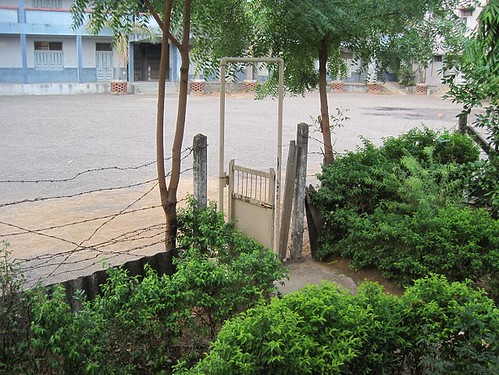
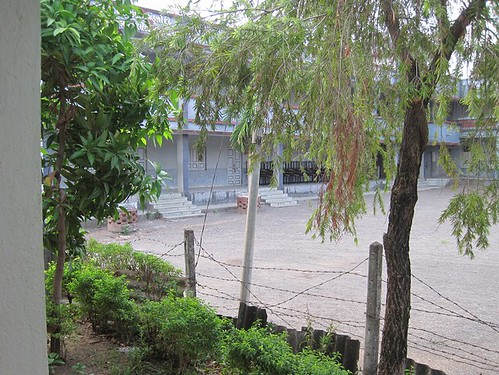
It was about a five-minute walk from our house to where we were going to have lunch. I guess I was expecting some sort of a sit-down restaurant, perhaps air-conditioned. Instead, we walked into the house of an old couple who had prepared us a meal and was eagerly waiting for us to arrive. We sat down along the wall of a room near the back of the house with our dishes laid out in front of us. I wish I'd been given even a quick crash course on proper Indian eating etiquette, but without this prior knowledge, I semi-pretended to know what I was doing while frequently glancing over to my friends' plates to see what they were doing. This is what a typical meal looked like: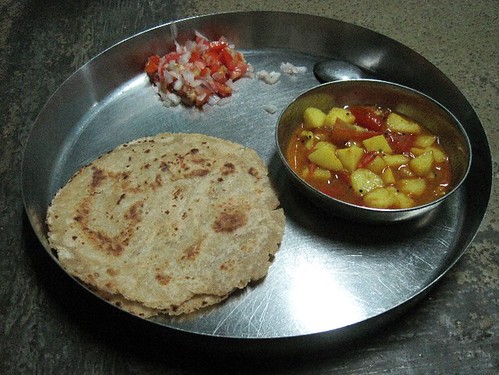
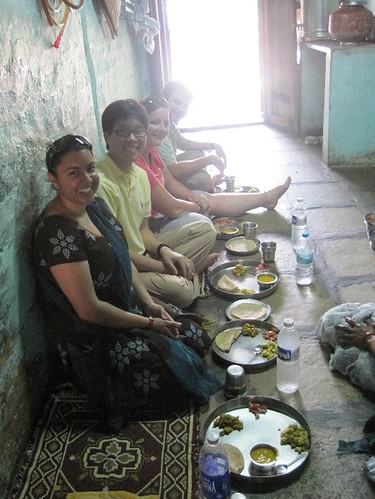
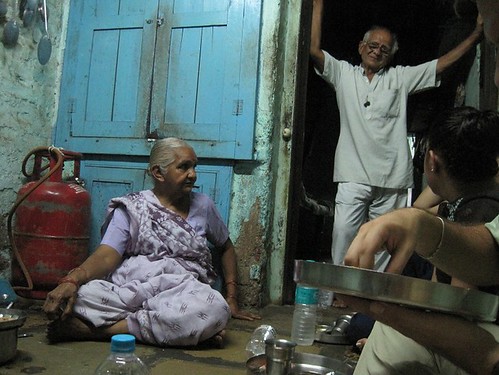
After dinner, we gave the old couple our warmest thanks and goodbye and decided to stroll through the town on our way back to our house. We couldn't spend too much time outside because of the heat, but here's a little bit of what we saw: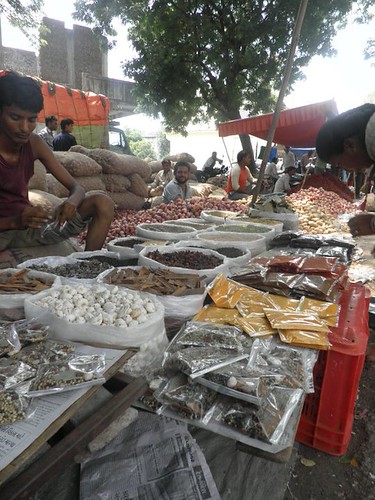
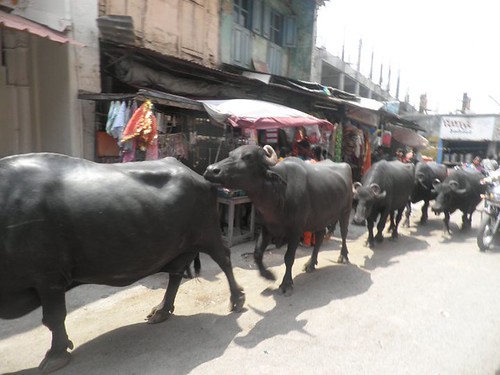
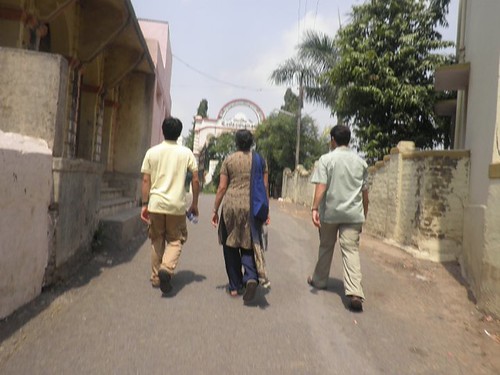
Well, I'll be stepping into my first classroom in less than 3 hours! Chatting with a friend, he asked "How do you feel?! Scared? Excited??" I said both. I heard the students are really excited to meet us, but at the same, there are going to be so many of them! Wish me luck!! Next episode: The House.
Bon Voyage!
6.11.2010
So I know I ended last time saying that the next time you hear from me, I'd probably have arrived in Kadod. I'm not there yet! But I felt that with so much going on, being on the cusp of a lot of changes, writing one last thing would be appropriate.
I know what you're thinking.. "Eric, you're going to India, not France." That's beside the point. This is a little photo booklet that I'm bringing with me. Over the past couple days, I've filled it with pictures and memories of friends and family, and somehow, it ended up being a pretty painstaking process. I felt like I was dissecting the last few years of my life, turning over rocks that hadn't been turned in a while, laughing in the inside recalling funny episodes, or reflecting on how things have changed so much. Closing the book and looking at that small, retro-looking plane on the cover, I had the feeling that I was leaving a lot of things behind, that this book full of still images might be representative of how these memories would now just always be memories. But I made this photobook because I plan on keeping it with me wherever I travel this year, and I think that as far as memories and experiences go, that's what happens when God gives us new doors to open. Not knowing what this year, or post-graduation life for that matter, is going to look like for certain, I default to a state of nostalgia, just wanting to relive those "glory days" I see in the book. But I'm sure whatever God allows me to experience in the next however many years, I'm going to have more than enough to fill up another one of these books. So I guess it's not so much that I'm packing things up and leaving them behind. While some people do that of their own will or out of necessity, I want to think that while I was making this book, I was reflecting, processing, then storing my experiences somewhere I'd remember since I know I'll always revisit.
Ironically, I got an email from a friend today with the subject "bon voyage." In it, he quoted from Dr. Seuss' Oh, the Places You'll Go, and since in just a few hours I'll be starting the long trek from Atlanta to Kadod, the doctor's words were never more fitting.
Today is your day!
Your mountain is waiting.
So... get on your way!
Thank you to all of you for the ways that you've been so supportive of me. I couldn't have asked for a better send-off! For those of you who want to write me the old-fashioned way while I'm gone, my mailing address is down below, and for those who are more comfortable with recent technology, add me on Skype! (id: eric.huh)
Eric Huh
c/o Principal Mahida
Kadod High School
Kadod, Ta: Bardoli Di: Surat Gujarat
394 335
INDIA
Prologue
6.4.2010
Aavo Padharo!
It's official! My flight to India's been confirmed!
June 11, 2010
Depart - 9:40pm (New York, NY)
Arrive - 11:30am (Frankfurt, Germany)
Depart - 1:30pm (Frankfurt, Germany)
Arrive - 1:00am (Mumbai, India)
Total Trip Duration: 17hr 50min
I normally don't do a lot of thinking in the shower, but for some reason this morning, I thought about what my first class would be like, trying to imagine how it's going to feel having 80 pairs of eyes focused intently on me while I try (most likely unsuccessfully) to deliver my first lesson plan. I confess, I had a slight panic attack.
It's going to be that experience and many, many others that I want to be able to share with all of you while I'm abroad. I want you all to be as much a part of my year-long journey as possible by reading stories, flipping through pictures, and watching occasional (maybe embarrassing) videos. I want you to know not only about my joys and successes, but also about my struggles and disappointments because a good friend told me that, to him, getting to know someone is like seeing them past all the layers of armor that we all naturally wear. I promise to be as honest and open about my experiences in Kadod and throughout Asia, so at times, I hope you can feel like you're traveling with me!
I want to thank all of you for all the support you've been giving me over the past few months as I've been preparing for this fellowship. Even though I anticipate a lot of challenges when I hit the ground, I know that through your thoughts, prayers, and encouragements, I'll have at least a few extra shoulders to lean on every day. Well, that's it for this first entry! Next time, I'll probably be writing from my small house on school grounds, so expect some pictures and hopefully some not-so-stressful travel stories!
Pachi maliye!
Eric

